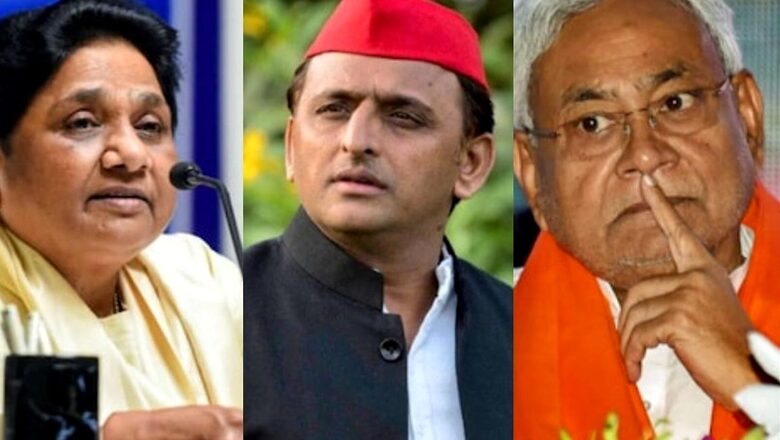
views
Akhilesh Yadav, elected president of the Samajwadi Party for a third term, asked party workers on Thursday to bring together supporters of Dalit icon Bhimrao Ambedkar and socialist leader Ram Manohar Lohia to form a national party.
However, Mayawati was quick to retort, saying his effort to show himself as an Ambedkarite is an “eyewash” inspired by the “greed for votes”. In a Hindi tweet, the Bahujan Samaj Party chief said this attempt by the Samajwadi Party to show itself as an Ambedkarite is a “drama and deceit” as done by other parties.
1. समाजवादी पार्टी द्वारा अपने चाल, चरित्र, चेहरा को ’अम्बेडकरवादी’ दिखाने का प्रयास वैसा ही ढोंग, नाटक व छलावा है जैसा कि वोटों के स्वार्थ की ख़ातिर अन्य पार्टियाँ भी अक्सर यहाँ ऐसा करती रहती हैं। इनका दलित व पिछड़ा वर्ग प्रेम मुँह में राम बग़ल में छुरी को ही चरितार्थ करता है।— Mayawati (@Mayawati) September 29, 2022
SP’s ‘National Ambition’
Yadav (49), who in his fresh term will lead the party in the 2024 Lok Sabha polls and the 2027 Uttar Pradesh elections, said his father and SP founder Mulayam Singh Yadav always wanted the SP to become a national party. READ MORE on Akhilesh’s ‘ambition
The SP currently is a state party, according to the Election Commission criteria. A party has to fulfill any of the three criteria to be declared a national party: winning two per cent of seats in the Lok Sabha (11 seats) from at least three different states in the latest polls, winning six per cent of the total valid votes in at least four states in an election to LS or a legislative assembly, in addition to winning four Lok Sabha seats; or being recognized as a state party in at least four states.
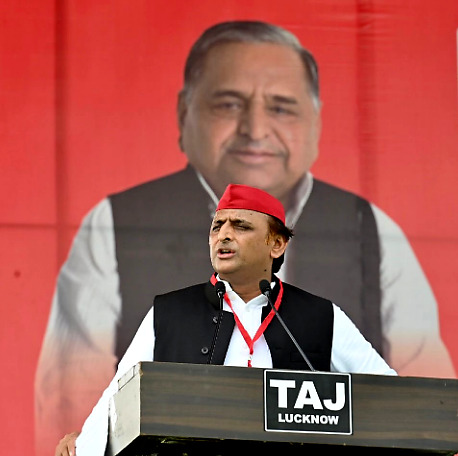
Taking over from his father, Yadav first become SP president at an emergency meeting of the party in the backdrop of power tussle in the family in January 2017, and for the second time at the scheduled party national convention at Agra in October the same year.
“It should be the effort of the socialists that those who follow the principles of Babasaheb Bhimrao Ambedkar and Dr. Ram Manohar Lohia (socialist idealogue) be brought together to work towards saving the Constitution and democracy,” Yadav told the partymen at the Ramabai Ambedkar Maidan, which was built during the chief ministership of BSP supremo Mayawati.
‘Message for BJP’
Claiming, without evidence, that the BJP “snatched” victory from his party in the recent Assembly elections by “misusing official machinery”, Yadav told his party workers, “This government is not made by people’s vote. When you had gone to the public for membership drive, you must have realised the people themselves do not believe as to how a BJP government was formed. These people have snatched your government.” “The BJP knew that being out of power in Uttar Pradesh meant going out of power in Delhi, so it (BJP) did everything that they could,” he alleged.
किसान, मज़दूर, गरीब साथ में आएं ~ मिलकर अपना मान-अधिकार बचाएं!’ pic.twitter.com/NKUnjvxmkt— Akhilesh Yadav (@yadavakhilesh) September 29, 2022
Hitting out at the Election Commission, Yadav alleged at the behest of BJP “Panna in-charges” (booth incharges), at least 20,000 votes from the SP core base i.e. Yadav and Muslims in every assembly constituency were removed. “If you want, get it checked. It was part of BJP’s strategy.” Despite all these “wrongdoings”, a BJP government would not have been formed “had we fought and increased votes by just two-three per cent in our strong booths.” He asked SP workers to make their booth the strongest so that not a single vote is missed. He alleged big industries and factories are being taken to BJP-ruled Gujarat while states like Uttar Pradesh and Bihar are left in the lurch.
A Common Cause for UP, Bihar
Yadav’s common cause for Uttar Pradesh and Bihar comes in the backdrop of his recent meeting with Bihar Chief Minister Nitish Kumar who is trying to unite opposition parties against the BJP in run up to the 2024 general elections. READ MORE on the ‘alliance’
But Can SP Survive?
Once the state’s youngest chief minister, Akhilesh Yadav has been struggling to fare good in UP. The Samajwadi Party was unable to retain its position as Leader of the Opposition in the Uttar Pradesh Legislative Council in July, as its seat tally fell to less than 10% of the Upper House’s strength.
Since the 2014 general election, the party has been steadily losing ground in the state to the BJP. It has lost three elections since then, including assembly elections in 2017 and 2022, as well as the 2019 general election, despite emerging as the clear challenger in what appears to be a bi-polar contest.
In the recent Lok Sabha bypolls in the SP’s strongholds of Rampur and Azamgarh, the party lost Rampur in a straight contest, while the BJP benefited from a multi-cornered contest in Azamgarh, a seat won by party chief Akhilesh Yadav in 2019.
pic.twitter.com/9CIsJeNmC6— Akhilesh Yadav (@yadavakhilesh) September 29, 2022
After it’s defeat in the assembly elections, SP accused Mayawati of “transferring” her votes to the BJP. Yadav and his colleagues suspected that this was what increased the latter’s vote share. In 2022, the BJP received 41.29% of the vote, up from 39.47% in 2017.
However, it may have been the SP’s ‘short-sightedness’ that cost it the polls. According to reports, while the BJP’s campaign centred on temples in Ayodhya, Kashi, and Mathura, among other places, the Samajwadi Party, on the other hand, formed a rainbow coalition with leaders from the Muslim, SC, and OBC communities. Thus, the BJP was able to use Hindutva to its advantage by accusing the SP of “Muslim appeasement.” The 2013 Muzaffarnagar riots were among the issues that took centre stage in this context.
In political circles, the Samajwadi Party is known as the party of Muslims and Yadavs (M+Y). While Akhilesh Yadav received support from these communities, he was also unable to persuade non-Yadav OBCs to vote SP instead of BJP.
This Amid BSP’s Clean Sweep
With just one seat to its name, Bahujan Samaj Party (BSP) displayed its most dismal performance in Uttar Pradesh assembly elections. Mayawati had claimed the party would form an ‘iron clad’ government in UP, and while the declaration seemed far-fetched to most at the time, the party’s performance has proved it downright contradictory.
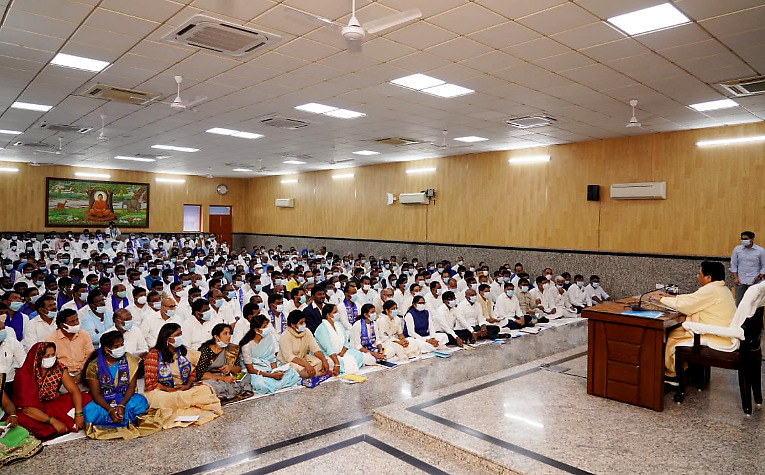
Mayawati has served four separate terms as the Chief Minister of UP. But her party may be heading towards oblivion. The Dalit-centric party had a Brahmin as its most visible face in the 2022 assembly elections. With Mayawati making only a few appearances during the election campaign, BSP MP Satish Chandra Mishra, a Brahmin, was left to carry the campaign on his shoulders.
Kanshi Ram founded the BSP in 1984 to represent the Bahujan community, which refers to Scheduled Castes, Scheduled Tribes, and Other Backward Classes (OBC), as well as religious minorities. After 2012, Mayawati gradually promoted Mishra as the party’s new face while exiling or marginalising all Dalit leaders, according to political pundits. The BSP now has no second-tier leadership, and even the Jatavs, who had supported Mayawati throughout her politically turbulent years, appear to have deserted her. READ MORE on what may have led to Mayawati’s downfall.
Meanwhile, Nitish’s ‘Formula for Success’
Earlier this year, Nitish Kumar switched partners once more to remain Bihar’s Chief Minister. According to a report by Indian Express, behind his remarkable success as a survivor is a mind that has conducted experiments in social repackaging and political messaging. More on this ↓
Mahadalits, Women & EBCs
Nitish Kumar coined the term Mahadalit in 2007, two years after becoming Chief Minister for the second time, to describe the poorest groups of Dalits. The State Mahadalit Commission recognised 21 of Bihar’s SC communities as Mahadalit, with Paswans being the sole exception. Ram Vilas was outraged, claiming that Mahadalit was an insult to Dalits as well as unconstitutional. But Nitish stood firm and over the years bestowed a variety of benefits on Mahadalits.
Nitish’s remarkable political innovation was Mahadalit, which was not so much social engineering as it was social repackaging by a new political-social entrepreneur who saw an opportunity to build a support base. Mahadalits have been staunch supporters of him for the past 15 years, the Indian Express says in its report.
Besides Mahadalits, Nitish also identified the potential of the Extremely Backward Classes (EBCs), also known as the Most Backward Classes (MBCs). This group, which consists of approximately 130 castes, is estimated to account for 28-30% of Bihar’s population. According to the report, while the EBCs are often the least discussed caste group in Bihar’s complex caste system, they are also powerful vote-swingers and balance-tilters who can determine the electoral fate of any party or political combination. In Bihar, it was the EBCs who tipped the scales in favour of the NDA in 2014, as Narendra Modi’s ‘tea-seller’ persona appealed to them, it says.
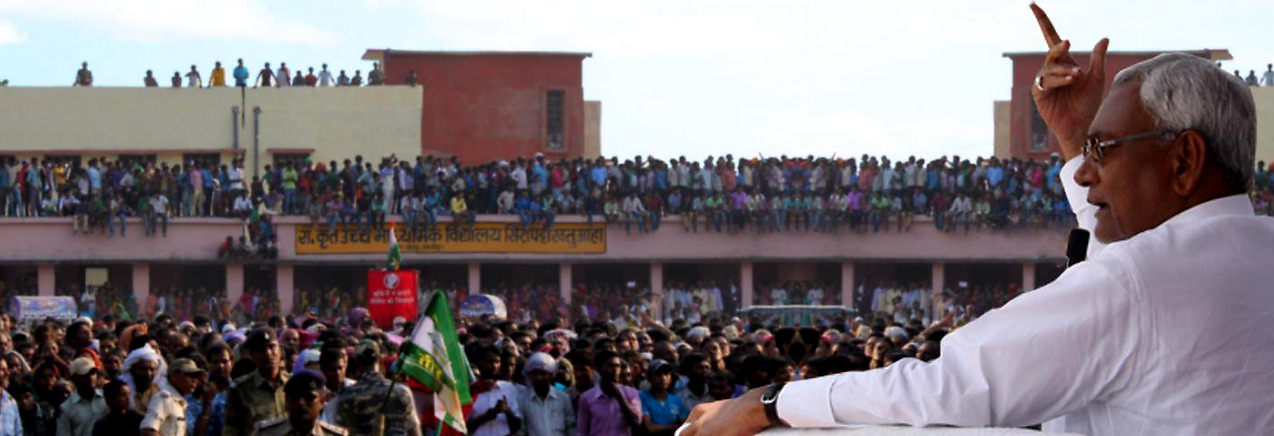
Nitish also dared to think outside the box by recognising the caste-neutral constituency of women and rallying their support behind him. Women’s support propelled him to the chief ministership in November 2015, and he imposed prohibition in Bihar the following year in response to a demand from that constituency.
Nitish launched a number of schemes for the welfare of women and girls during his tenure in power, often in tandem with his government’s schemes for Mahadalits and EBCs. He instituted a game-changing 50% reservation for women in panchayats, and last year reserved 33% of medical and engineering seats for women. The Bihar government has also granted women a 33% quota in government jobs, a 35% quota in police jobs, and a 50% quota in primary teaching jobs at the panchayat level, the report states.
With inputs from agencies
Read all the Latest Politics News and Breaking News here

















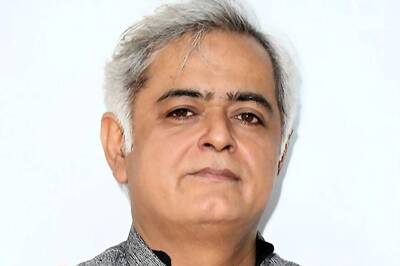


Comments
0 comment